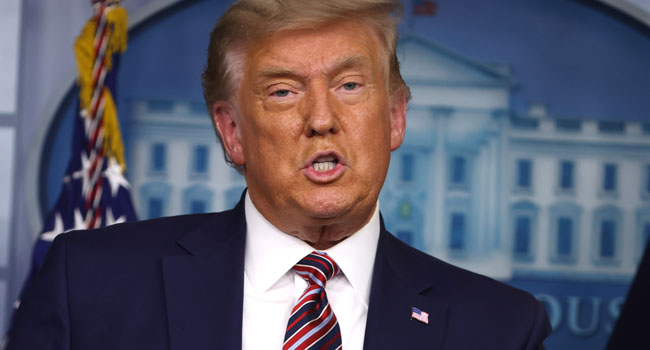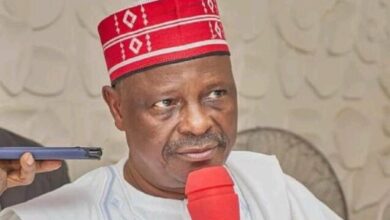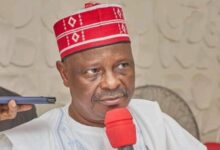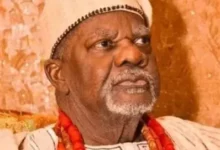MARADI AS BUHARI’S 60TH BIRTHDAY PRESENT TO NIGERIA

By FESTUS ADEDAYO

“The outcome of the Edo election, which many people have attributed, in large part, to the threat of visa ban by America and the UK, was necessary for us to instill sanity into the Nigerian electoral process. This is why I do not believe that Buhari ensured that peaceful election.”
Maradi, one of the three largest cities in Niger Republic, may yet be the metaphor of the fragility of the Nigerian state and an explainer of Nigeria’s 60 years post-independence wonky journey. It does this in the most succinct manner. With the Muhammadu Buhari government’s announcement last week of its intention to construct a railway line from Kano, passing through Kazaure, Daura, Katsina, Jibia to Maradi in Niger Republic, some jigsaw puzzles of the last 60 years of independence and the fault lines of the 106 years of Nigeria’s togetherness may confront us in their irritating minuscule.
Anyway, this Thursday, Nigeria will be 60. The Buhari government is not leaving any stones unturned in celebrating this epochal birthday. Responding to people’s bother that a country almost at its tethers like ours would still have space in its heart to fling cymbals, Minister of Information and Orientation, Alhaji Lai Mohammed, had a response: “For a country that has gone through a bitter, internecine civil war, years of political crisis, daunting security challenges, including religious and ethnic crisis, etc, our unity and our resilience (which by the way is what diamond represents) are worth celebrating.” Mohamed even descended into the world of horoscope to justify the celebration. “In certain cultures, the age of 60 is seen as the beginning of a new cycle of life and is usually well marked. For Nigeria as a country, the administration of President Muhammadu Buhari offers a new beginning,” he said.
Perhaps, Maradi is that beginning. If well configured, as Nigeria enters its post-60 existence, Nigerians may begin to use Maradi as a sharpener of their dud microscopic sense of appraisal of the calamity which the political elite constitutes to their survival. As I will show presently, undoubtedly, Maradi explains Buhari’s six years rule of Nigeria, the psychology of his government, his governance and the worldview of the man at the governmental driver’s seat.
Since the government’s announcement of that railway project, which will gulp $1.96 billion, uproar has ensued. Not uproar interrogating how the project will cater for the transportation needs of Nigerian cities of Kano, Kazaure, Daura, Katsina and Jibia, but because Buhari had the temerity to construct a railway corridor right inside another sovereign nation’s territory. Not to worry, however, says the Buhari government. Nigerians are misinformed about the extent of the railway construction. Garba Shehu, Senior Special Assistant to Buhari, had said,“Nigeria isn’t building rail line into Niger, but only to the designated Border point. An agreement between Nigeria and Niger in 2015, coordinated by the Nigeria-Niger Joint Commission for Cooperation, has a plan for ‘Kano-Katsina-Maradi Corridor Master Plan, (K2M)’ as it is called.”
Going by this, according to Shehu, “the two nations would each build a rail track to meet at the border town of Maradi. Nigerian delegates to that meeting comprised officials from the Ministry of Foreign Affairs, National Boundaries Commission, Federal Ministry of Industry, Trade & Investment, Ministry of Agriculture and Rural Development, Water Resources as well as those of Kano and Katsina states. The objective of the rail is the harnessing of raw materials, mineral resources, and agricultural produce. When completed, it will serve domestic industries and play the role of a viable transportation backbone to the West African sub region, starting with the neighboring Niger Republic, for their export and import logistic chain.”
The first question to ask Buhari and his megaphones is, who initiated that international boundary agreement? Was it a third party state? If Niger and Nigeria’s governments are mutually persuaded on the need to funnel Nigeria’s wealth to Niger, what stopped such an agreement? So why flaunt it as a testament of goodwill on the part of the two Fulani presidents of Niger and Nigeria?
More importantly, information about Maradi’s geography runs contrary to the presidency’s submission above. An originally Katsina, Hausa state, Maradi was, until the early 19th century when it acquired its independence, another home of Hausa traditional rump states. Founded by Katsina rulers and nobles who escaped Uthman Dan Fodio’s Sokoto Caliphate expedition, Maraba has till now not ceased from being home to elements of Katsina ruling class who see it as a second home. This is so bearing in mind that Maradi was formed by their exiled rulers. Indeed, Maradi has since that 19th century expedition, been administered by monarchs called Sarkin Katsina Maradi. Bordered on the west by the powerful Gobir exilic state, on the east by the Damagaram Sultanate and Sokoto to the South, Maradi is said to be the second largest city in Niger and also the administrative centre of the Maradi region. Emerging from an 1899 setback which saw its bloody destruction by the French Voulet-Chanoine Mission, Maradi later recovered from this destruction to emerge as one of the strongest economic outposts of the 20th to 21st centuries. In fact, by the 1950s, it had become a major population success, with a dynamic and modest but doubled population, a demographics that jumped up from a 1950 count of 8,661 to 80,000 in 1983.
The Voulet–Chanoine Mission, otherwise known as the Central African-Chad Mission, was a French military expedition which, in 1898, was sent from Senegal with the sole aim of conquering the Chad Basin, as well as ensure a unification of all French territories in West Africa. Operating under dual expeditions, the Voulet–Chanoine Mission operated alongside two other expeditions – the Foureau-Lamy and Gentil missions. One thing that marked out the expedition was its descent into depravity and extreme violence, in the mould of actions which are today being investigated and sanctioned by the International Criminal Court (ICC) in Hague.
Maradi however shares so many similarities and linkages with Nigeria, in spite of its French colonial heritage. First is Niger’s 1960 independence day, shared with Nigeria, and its boast of being a centre of Hausa culture, just like Kano’s merchant city renown which it shares with Maradi. Maradi is also a predominantly Fulani population and the Nigerian Naira is an acceptable currency in Maradi, just as the Niger official currency of CFA franc. During the 2015 elections, reports alleged that thousands of people crossed the Nigerien border from Maradi to Nigeria to vote for Buhari. In his 2016 campaign, Mahamadou Issoufou, Niger’s President who hailed from a town called Dandaji in Tahoua Department, a confessed sidekick of Buhari, reportedly affixed Buhari’s photograph to his as he jumped from one campaign podium to the other. On his own part, when he won the 2015 election, Niger was Buhari’s first port of call. He was received by a tumultuous crowd, especially his Maradi people, like a long-lost son come to town.
I went into this long history to paint a symbiosis between Buhari’s Katsina and Maradi and why the recent decision to construct a $1.96 million railway into the Nigerien city is an extension of the Katsina General’s penchant to deploy Nigeria’s resources in service of his prebendal sentiments.
Geographical information belie the presidency’s claim that Maradi is a border town of Niger Republic. Indeed, it is said that the city is 51 kilometers from the Nigerian/Niger border. This means that if the border was the bother of the Buhari government, it ought to have stopped the railway project 51 kilometers before Maradi. Extending this argument further and stoking it with the known chronic cronyism of the Buhari government, it then goes without saying that economic consideration was secondary to this government in this consideration but the urge to make good as son of the soil and the proclamation of Fulani hegemony. This hegemony has been at the core of the various crises between the North and South since Buhari came into office and are at the core of this railway project.
Buhari’s intention in the Maradi project would not have become a subject of intense debate as it has if his pedigree was not tainted with selfish cronyism, first to his Fulani stock and palpably to the Northern part of Nigeria where he hails from. His blatant blindness to the spirit of equitable distribution of wealth and positions as one of the indices of wedging together Nigeria’s fissiparous tendencies is very alarming. This is a reflection of the 60 years of inequity that has marked the post-independence relationship between the three regions of Nigeria.
It was why, when Buhari called for a celebration of Nigeria’s 60th, this call was met with stiff disdain. Yes, Nigeria’s numerical age addition is worthy of celebration, affirming Lai Mohammed’s submission. However, in terms of mileages, prospects and achievements of that 60-year old Nigeria, any call for celebration would amount to a blind and unrealistic self underscore.
Minister Mohammed turned the argument upside down when he said that causes to celebrate Nigeria’s 60th can be found in the “bitter, internecine civil war, years of political crisis, daunting security challenges, including religious and ethnic crisis” Nigeria underwent and “our resilience” in the face of all these. This is because, Nigeria is like the proverbial rat which escaped from a deadly entrapment that chopped off its tail. However, this same rat has begun to tread that same ruinous path leading to its place of blood, a path that almost cost it its neck.
In the hands of Buhari, Nigeria is like a country which has learnt nil lessons from its divisive civil war and is a kilometer away from its own ethnic war of Kigali. A country in Africa that can effectively answer to Lai Mohammed’s celebratory narrative is, undoubtedly, Rwanda. This is a country which emerged from an ethnic internecine and which, less than three decades after, has not only become stronger but is made stronger by its clear departure from the route of its ruins. Nigeria under Buhari, on the reverse, is at the brinks of an ethnic explosion, stoked by incendiary governmental actions like the Maradi railway project.
The truth is, a Nigeria at 60 gives little or no cause for cheers. It can only be meaningful in the sight of those who are profiting from its meaningless chaos and inexplicable stasis. Or in the sight of the contractors of the Nigeria@60 project who would smile to bank with loots therefrom. Let us tell ourselves the truth: the country envisaged by our forefathers at pre-independence, which many lost their lives fighting for its actualization, isn’t what we have now. Nigeria has become one of the most unexampled cases of politico-economic retardation, not only on the African continent but in the world at large.
The above, as grippingly sad and lamentable as it is, isn’t even the cause for despondency at 60. The major reason to be downcast is that, other than the unscientific spiritual, metaphysical realm where emotions and unseen hope are bandied, the scientific Nigerian horizon does not call for cheers in the foreseeable future. Nigeria is today a country that would make any pools-staker, betting on the possibility of her renewal within a specified period of time, to lose their deposits. This is because characters like Buhari are systemically wired to continue to administer Nigeria for a very long time to come.
Oshiomhole and flakes of Edo governorship election
The Edo governorship election has come and gone, leaving its flakes hovering in the sky. The flakes come in the form of lessons to be learnt from the highly-charged pre-election pundits’ prediction on Edo and Nigeria as a whole, the post-election expectations from Edo governor, Godwin Obaseki, winner of the said election, among many others.
Let me begin from the last flake. Obaseki has done well by acknowledging the people of Edo State as the Number One hero of that victory, as well as his colleague governors who demonstrated espirit-de-corps in supporting him. His thank-you visits to those governors are also in order as a major consideration in African social relationship. In fact, you could group his visit to President Muhammadu Buhari immediately after the election as belonging to this same social requisite category.
However, a major debate has been provoked by these visits and which is permutations that he would soon jump ship to the All Progressives Congress (APC). The governor’s response to the insinuations is also very apt. He had been quoted as having said that if he abandoned the PDP that shielded him from the APC tempestuous downpour that threatened to consume him, that move would define him as an ingrate who stands for nothing. Which is very true.
Granted that the borderlessness of Nigerian political party space is well recognized, jumping ship for Obaseki, though it may portend no serious political implication, would be a total confirmation that Nigerian politicians have indeed sold their souls to Mephistopheles for a farthing. Even if symbolic, Obaseki should remain in the PDP for the remaining four years of his stay in office to demonstrate that, no matter how few, men of principles can still be found among the political species.
Another flake is what should be the speed of Obaseki’s delivery of democratic dividends to the people of Edo State. Experiences have shown that second terms for governors have become a huge liability. Second-termers go into that office relaxed, unexcited and very uninspiring in bonding with the people. Obaseki should justify the people’s sweats by bailing out of that loop. He should populate that school of people who believe that society would benefit more if elected executive office holders get a second term.
The Adams Oshiomhole flake has also been at issue. What becomes of Oshiomhole in Obaseki’s governmental estimation? Obaseki has been quoted to have said that if the former APC chairman behaves well, he would not be smoked out of Edo but if he carries himself like the carnivorous lion imagery he invoked, he would be out of the state. I will want an Obaseki who visits Oshiomhole to ask for his hands of fellowship. Having been fought for by providence and the people, Obaseki should not be seen in the milieu of revenge.
Finally, I found the UK’s response to the Buhari government’s frown at the visa ban placed on Nigerian politicians who subvert the will of the people at the polls very apt. Last week, I had lampooned that Buhari government statement as odd, realizing that the UK and America reserved the right to decide who they allowed inside their territories. The UK, during the week, said exactly that. The outcome of the Edo election, which many people have attributed, in large part, to the threat of visa ban by America and the UK, was necessary for us to instill sanity into the Nigerian electoral process. This is why I do not believe that Buhari ensured that peaceful election. These countries are where politicians ferry their loots and places of Buhari and his acolytes’ convalescence. Can you imagine a visa ban on despicable Nigerian politicians who go abroad to treat ailments as minor as tooth aches? So, if you ask me, Buhari and his gang behaved well in Edo, afraid of UK/US visa ban.









